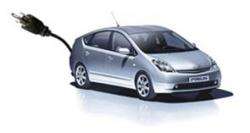September 10, 2008 weblog
100-mpg plug-in hybrids popping up in US

Although many people would like to drive more fuel-efficient vehicles, most of us have to wait for the large vehicle manufacturers to mass-produce affordable cars that run on alternative power. In the meantime, a handful of smaller companies have begun taking the energy crisis into their own hands. By retrofitting hybrids like the Toyota Prius with a second battery pack, they麓re converting these cars into hybrid plug-ins that can recharge from a wall outlet and drive a short commute on all electric power.
A recent article in North Carolina麓s The News & Observer has highlighted a Raleigh-based company, Advanced Vehicle Research Center (AVRC), that has four employees and can retrofit a Prius in about four hours for a cost of $10,400. The AVRC is one of eight US companies authorized to install lithium ion batteries manufactured by 23 Systems, a Massachusetts company.
AVRC麓s converted Priuses can get from anywhere between 60 and 100 mpg, depending on driving habits, which roughly doubles the gas mileage of a standard Prius. Advanced Energy, a Raleigh nonprofit research organization and one of AVRC麓s customers, has even exceeded 200 mpg in a test under optimal conditions.
The conversion process is relatively uncomplicated. The mechanics remove the spare tire in the trunk, and replace it with a 170-pound lithium ion battery pack, like a much larger version of a cell phone battery. A plug from the back of the bumper can be inserted into a conventional wall outlet, where a full charge lasts about 3.5 hours and costs less than 75 cents.
The modified Prius draws from the new battery first, giving the car a range of about 35 miles on all-electric power, making gasoline optional on short commutes. When the battery is depleted, the Prius runs like a standard hybrid, using its gas engine and regenerative braking to charge its nickel metal hydride battery.
According to the Plug-In Hybrid Coalition of the Carolinas, there are about 150 plug-in hybrids on US roads today. Most of the AVRC麓s customers have been corporations with large fleets, but they recently made their first conversion for an individual. Their clients include Progress Energy, Duke Energy, the city of Raleigh, and North Carolina State University麓s Advanced Transportation Energy Center. These organizations are tracking and sending data on the cars to the Idaho National Laboratory, a federal research institute that is studying plug-in hybrids.
The plug-in modifications aren麓t authorized or endorsed by Toyota, which plans to make its own Prius plug-in commercially available in 2010 in the US. Also in 2010, Chevrolet plans to release the Volt (which runs on the same 23 lithium ion battery used by AVRC), which is expected to be more economical than AVRC麓s conversions.
The AVRC acknowledges that $10,400 is a hefty price tag for the average driver - AVRC founder and president Richard Dell estimates that it could take 140,000 miles to recover the cost through fuel savings. But the important thing is that they麓ve demonstrated that the technology is viable and available right now. "It麓s given us more confidence that it麓s not a matter of if plug-in vehicles will happen, but when," said Mike Rowand, Duke Energy麓s director of advanced customer technologies.
More information:
via:





















